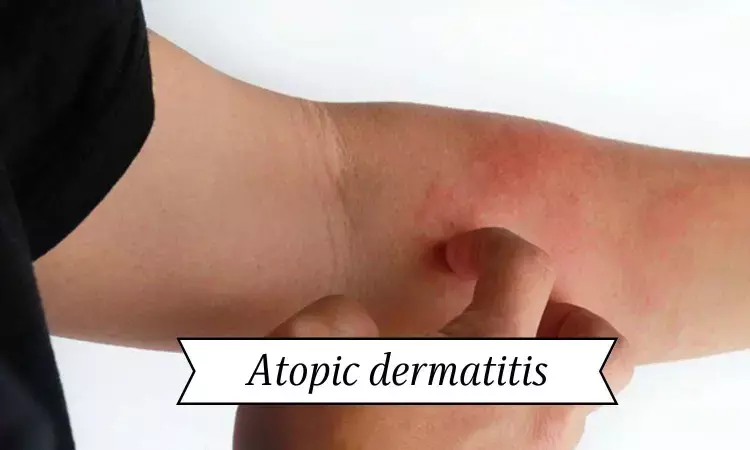- Home
- Medical news & Guidelines
- Anesthesiology
- Cardiology and CTVS
- Critical Care
- Dentistry
- Dermatology
- Diabetes and Endocrinology
- ENT
- Gastroenterology
- Medicine
- Nephrology
- Neurology
- Obstretics-Gynaecology
- Oncology
- Ophthalmology
- Orthopaedics
- Pediatrics-Neonatology
- Psychiatry
- Pulmonology
- Radiology
- Surgery
- Urology
- Laboratory Medicine
- Diet
- Nursing
- Paramedical
- Physiotherapy
- Health news
- Fact Check
- Bone Health Fact Check
- Brain Health Fact Check
- Cancer Related Fact Check
- Child Care Fact Check
- Dental and oral health fact check
- Diabetes and metabolic health fact check
- Diet and Nutrition Fact Check
- Eye and ENT Care Fact Check
- Fitness fact check
- Gut health fact check
- Heart health fact check
- Kidney health fact check
- Medical education fact check
- Men's health fact check
- Respiratory fact check
- Skin and hair care fact check
- Vaccine and Immunization fact check
- Women's health fact check
- AYUSH
- State News
- Andaman and Nicobar Islands
- Andhra Pradesh
- Arunachal Pradesh
- Assam
- Bihar
- Chandigarh
- Chattisgarh
- Dadra and Nagar Haveli
- Daman and Diu
- Delhi
- Goa
- Gujarat
- Haryana
- Himachal Pradesh
- Jammu & Kashmir
- Jharkhand
- Karnataka
- Kerala
- Ladakh
- Lakshadweep
- Madhya Pradesh
- Maharashtra
- Manipur
- Meghalaya
- Mizoram
- Nagaland
- Odisha
- Puducherry
- Punjab
- Rajasthan
- Sikkim
- Tamil Nadu
- Telangana
- Tripura
- Uttar Pradesh
- Uttrakhand
- West Bengal
- Medical Education
- Industry
Upadacitinib Outperforms Dupilumab in Treating Atopic Dermatitis: Study

Researchers have found that upadacitinib (Rinvoq) was more effective than dupilumab (Dupixent) in treating moderate-to-severe atopic dermatitis in a phase 3b/4 trial, according to data from the LEVEL UP trial announced on April 25, 2024. The study demonstrated that a greater proportion of patients achieved relief and resolution of symptoms with upadacitinib than with dupilumab. This was announced by AbbVie and was conducted by Jonathan Silverberg, MD, PhD, MPH, director of clinical research and professor of dermatology at the George Washington University School of Medicine and Health Science.
Atopic dermatitis (AD) is a chronic skin condition that can significantly impact patients' quality of life. Both dupilumab and upadacitinib have become important treatments in managing AD, providing options for patients who do not respond adequately to other therapies. The LEVEL UP trial was initiated in 2022 to compare the effects of these agents and guide clinicians in their decision-making.
The LEVEL UP trial included patients aged 12 years and older with moderate-to-severe AD. Participants underwent a 16-week treatment period, followed by an additional 16-week period of treatment with protocol-defined adjustments. The primary endpoint was achieving both a 90% reduction in the Eczema Area and Severity Index (EASI 90) and a Worst Pruritus Numerical Rating Scale of 0 or 1 (WP-NRS 0/1) at the 16-week mark.
Patients in the trial received either upadacitinib starting at 15 mg daily (escalated to 30 mg based on response) or dupilumab at 600 mg initially, followed by 300 mg every two weeks for subjects weighing ≥60 kg. Those weighing less than 60 kg received an initial dose of 400 mg, followed by 200 mg every two weeks.
The key findings of the study were:
• A significantly higher percentage of upadacitinib-treated patients achieved the primary endpoint compared to those treated with dupilumab (19.9% vs 8.9%, P < .0001).
• Upadacitinib also outperformed dupilumab in terms of EASI 90 (40.8% vs 22.5%, P < .0001) and WP-NRS of 0/1 (30.2% vs 15.5%, P < .0001) at the 16-week mark.
• The safety profile of upadacitinib was consistent with previous AD studies, with no new safety concerns identified.
• Both medications had a similar rate of serious adverse events (0.9%).
The results from the LEVEL UP trial suggest that upadacitinib may be a more effective treatment option than dupilumab for patients with moderate-to-severe AD. This can help guide clinicians in selecting the most effective treatments for their patients.
The LEVEL UP trial provides evidence that upadacitinib outperforms dupilumab in treating moderate-to-severe atopic dermatitis, offering higher rates of symptom relief and skin clearance. The safety profile of upadacitinib remains consistent with previous studies, making it a promising option for AD management.
Reference:
New Data Show RINVOQ® (upadacitinib) Demonstrated Superiority Versus DUPIXENT® (dupilumab) Across Primary and All Secondary Endpoints in an Open-Label Head-to-Head Atopic Dermatitis Study. AbbVie. April 25, 2024. https://news.abbvie.com/2024-04-25-New-Data-Show-RINVOQ-R-upadacitinib-Demonstrated-Superiority-Versus-DUPIXENT-R-dupilumab-Across-Primary-and-All-Secondary-Endpoints-in-an-Open-Label-Head-to-Head-Atopic-Dermatitis-Study. Date accessed: April 25, 2024.
Dr Riya Dave has completed dentistry from Gujarat University in 2022. She is a dentist and accomplished medical and scientific writer known for her commitment to bridging the gap between clinical expertise and accessible healthcare information. She has been actively involved in writing blogs related to health and wellness.
Dr Kamal Kant Kohli-MBBS, DTCD- a chest specialist with more than 30 years of practice and a flair for writing clinical articles, Dr Kamal Kant Kohli joined Medical Dialogues as a Chief Editor of Medical News. Besides writing articles, as an editor, he proofreads and verifies all the medical content published on Medical Dialogues including those coming from journals, studies,medical conferences,guidelines etc. Email: drkohli@medicaldialogues.in. Contact no. 011-43720751


